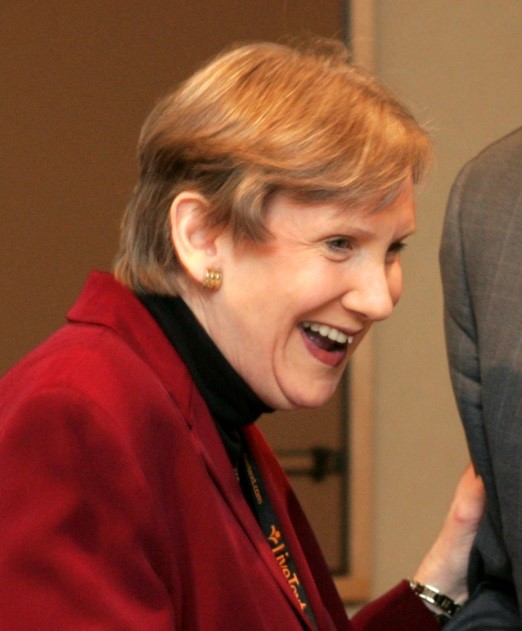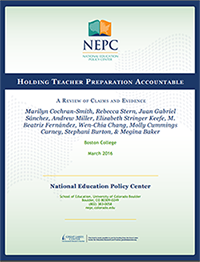04 Oct2016
By Tim Finklea

More than 1,400 education professionals turned out for the 2016 Fall CAEP Conference (CAEPCon) in partnership with AACTE, held September 29–October 1 in Washington, DC.
The conference opened the afternoon of September 29 with words of welcome from AACTE President/CEO Sharon P. Robinson and CAEP President Christopher Koch. Robinson said that AACTE “stands shoulder to shoulder with CAEP to make accreditation a reality,” and that “we believe in accreditation because accreditation adds value.”
30 Sep2016
By Angela Maynard Sewall
When we are faced with changes in standards or other expectations for our programs, we often worry about their impact on our work. But sometimes revisions are needed to improve our processes and outcomes, informed by our ever-growing body of research and experience with partners in the field. How can new rules or laws enhance rather than upend our work?
Please join me October 5 at 1:00 p.m. EDT for a free webinar, How Accrediting Organizations and Standards Can Improve Principal Quality, made possible with support from The Wallace Foundation. Panelists will discuss their varied viewpoints on these parameters for improvement and lessons they’ve learned in national and state agencies, PK-12 districts, and higher education.
27 Sep2016
By Deborah Koolbeck
On Friday, September 23, the U.S. Department of Education sent a letter to the presidents of certain institutions that are eligible for TEACH grants, announcing a change in eligibility requirements. If you are at one of these institutions, a response must be filed with the Department within 30 days of the letter – meaning by October 23.
Previously, institutions could offer the grants if their programs held either (a) specialized accreditation awarded through a Department-recognized agency or (b) state approval plus a requirement of at least 10 weeks of full-time preservice clinical experience and pedagogical course work. The letter (see PDF) explains that effective September 22, the Department no longer recognizes any national accreditor for educator preparation programs, eliminating option (a) as a qualifier for eligibility.
13 Sep2016
By Rodrick Lucero
When I was advising prospective teachers at my former institution, I encountered many candidates who had strong potential as educators but struggled to pass the licensure tests. For some of these students, it was helpful to offer practice tests, with feedback, to help combat their test anxiety, but it was challenging for me to find time for this work.
So when I recently met Stephanie Shapiro, the partnerships manager of a test-prep company that offers just this kind of service to teacher candidates–some of it for free–I was intrigued and persuaded her to join AACTE as a new affiliate member. I asked her to share how her organization, Teachers Test Prep, is helping teacher candidates pass their exams. Here’s her response:
06 Sep2016
By Tim Finklea
The Council for the Accreditation of Educator Preparation (CAEP) seeks presentation proposals for sessions to be held at the 2017 spring and/or fall CAEPCon. Proposals must be submitted online by October 10.
01 Aug2016
By Kathryn Opatick
Are you looking to expand your understanding of quality assurance processes? Give your practice a boost with an affordable and convenient Online Professional Seminar (OPS), offered through AACTE’s Quality Support Center.
Joseph Lubig, an associate dean at Northern Michigan University, has completed five of the six seminars on assessment and accreditation. He says he especially enjoyed OPS #5: Preparing for Accreditation and its practical assistance for meeting the Council for the Accreditation of Educator Preparation (CAEP) standards, including legacy standards of the Teacher Education Accreditation Council (TEAC).
01 Aug2016
By Tim Finklea
Please join the Council for the Accreditation of Educator Preparation (CAEP) in partnership with AACTE for this fall’s CAEP Conference, September 29–October 1 in Washington, DC. Online registration is open now through September 9.
The CAEP Conference, known as “CAEPCon,” is an opportunity to share evidence of innovations, continuous improvement, and transformational practice as well as to be informed on the CAEP accreditation process. Held twice a year, the event convenes educator preparation providers, state and local education agencies, and various education organizations and associations to share strategies and best practices along with innovative ideas about accreditation’s role in ensuring candidate readiness.
28 Jun2016
By Tim Finklea
At its biannual meeting this month, the Board of Directors of the Council for the Accreditation of Educator Preparation (CAEP) adopted language to clarify and refine the academic achievement component required in Standard 3: Candidate Quality, Recruitment, and Selectivity. Other board action included approving revisions to the CAEP Standards for Advanced Programs, bylaw updates, budgetary work, and other business.
For Standard 3, Component 2—which addresses candidates’ academic achievement—the following actions were approved, according to a statement from the CAEP board:
21 Jun2016
By Rodrick Lucero
Last week, the AACTE Clinical Practice Commission met with members of the former CAEP State Alliance for Clinical Preparation and Partnerships for a summit that began merging the outcomes from the alliance’s work into the ongoing efforts of the commission. Summit participants from the alliance were invited to join the commission, which is now in Round 2 of its quest to better define clinical practice and related best practices for the field.
The synergy in the room when these two groups got together was palpable. They began as if they had been working together forever. Each group has been studying clinical practice with an eye to advancing the recommendations of the 2010 NCATE Blue Ribbon Panel report, but tackling the work from different angles. The alliance’s findings, produced by state-based teams through work cycles grounded in improvement science, provide a valuable complement to the commission’s national effort. (CAEP, the Council for the Accreditation of Educator Preparation, allowed the alliance to sunset this spring.)
09 Jun2016
By Sharon Robinson

Carol Smith, 1949–2016
Carol E. Smith, longtime AACTE staffer who deftly guided the Association through the early standards movement and years of accreditation reforms, died June 6 in Falls Church, Virginia. She was 66.
A native of Johnson City, Tennessee, Smith gave 23 years of devoted service to AACTE. After an early career in the banking and legal fields, she joined the AACTE staff as an administrative assistant in 1985 and worked up to senior leadership as vice president for professional issues before leaving in 2008.
Her portfolio of responsibilities was vast, including orchestrating the Association’s liaison with the National Council for Accreditation of Teacher Education, contributing to the design of the Interstate New Teacher Assessment and Support Consortium, and convening the Task Force on Teacher Education as a Moral Community, among others.
10 May2016
By Rodrick Lucero
The National Policy Board for Education Administration (NPBEA) seeks comment by May 22 on new draft standards for leadership preparation programs. Once approved, these preparation standards will replace the Educational Leadership Constituent Council (ELCC) standards and be used to guide the educational leadership program design, accreditation review, and state approval of preparation programs for principals and superintendents.
The proposed National Educational Leadership Preparation (NELP) Standards specify what novice leaders should know and be able to do, at the building and district level, after completing a high-quality educational leadership preparation program. The new draft aligns the standards for preparation programs with the Professional Standards for Educational Leaders (PSEL) approved by NPBEA last fall. Formerly known as the Interstate School Leaders Licensure Consortium (ISLLC) standards, the PSEL standards articulate the knowledge and skills expected of school leaders broadly.
05 Apr2016
By Sharon Robinson
It’s axiomatic that experts in a field are better equipped than outsiders to design interventions that will work. Yet in education, we face a constant barrage of external reform efforts that fail to incorporate professional knowledge and expertise—and they just don’t work.
This point is reinforced in recent research out of the National Education Policy Center. In this study, Marilyn Cochran-Smith and her colleagues at Boston College (MA) examine the evidentiary base underlying four national initiatives for teacher preparation program accountability and improvement. They find that only one of the initiatives—the beginning-teacher performance assessment edTPA, designed and managed by the profession—is founded on claims supported by research. With a measure that is valid, scoring that is reliable, and therefore results that are accurate, we have a serious tool for program improvement.
22 Mar2016
By Kristin McCabe
 A new policy brief out of the National Education Policy Center (NEPC) reviews the evidentiary base underlying four national initiatives for teacher preparation program accountability and finds that only one of them—the beginning-teacher performance assessment edTPA—is founded on claims supported by research. The other three mechanisms included in the study are the state and institutional reporting requirements under the Higher Education Act (HEA), the Council for the Accreditation of Educator Preparation (CAEP) standards and system, and the National Council on Teacher Quality (NCTQ) Teacher Prep Review.
A new policy brief out of the National Education Policy Center (NEPC) reviews the evidentiary base underlying four national initiatives for teacher preparation program accountability and finds that only one of them—the beginning-teacher performance assessment edTPA—is founded on claims supported by research. The other three mechanisms included in the study are the state and institutional reporting requirements under the Higher Education Act (HEA), the Council for the Accreditation of Educator Preparation (CAEP) standards and system, and the National Council on Teacher Quality (NCTQ) Teacher Prep Review.
Holding Teacher Preparation Accountable: A Review of Claims and Evidence, conducted by Marilyn Cochran-Smith and colleagues at Boston College (MA), investigated two primary questions: What claims does each initiative make about how it contributes to the preparation of high-quality teachers? And is there evidence that supports these claims? In addition, researchers looked at the initiatives’ potential to meet their shared goal of reducing educational inequity.
01 Mar2016
By Renée A. Middleton
Last week, the AACTE Board of Directors subcommittee formed to engage with the Council for the Accreditation of Educator Preparation (CAEP) reported back to the Board on its two primary charges. First, we shared results from our survey of AACTE members, and second, we offered guidelines and operating principles for the person selected to be the AACTE representative to the CAEP board.
Chris Koch, current president of CAEP, was in attendance at the meeting and listened to the survey results. He expressed appreciation for the engagement of the AACTE membership and said he planned to share the findings with the CAEP staff. He noted that a collaborative, mutually beneficial outcome is his goal for the information that was shared. His recognition of the efforts of the AACTE membership has set a tone for partnership as our organizations move forward.
02 Feb2016
By Renée A. Middleton and Rodrick Lucero
The AACTE Board of Directors subcommittee formed to engage in conversation with the Council for the Accreditation of Educator Preparation (CAEP) has concluded surveying AACTE members regarding their perspectives related to CAEP, standards, and accreditation in general. Thanks to all who responded to our survey!
The survey, which invited feedback last fall, received responses from 176 respondents in 46 states. Members of the subcommittee met with AACTE President/CEO Sharon Robinson on January 21 to begin an initial review of the responses. This month, we will finalize our review of the data and present our findings and recommendations to the AACTE Board of Directors, which commissioned the work last spring. At this point, we can report that the standards that garnered the most desire for continued dialogue and attention were Standards 3 and 4. Following the February Board meeting, we will share more specific themes from the survey.









